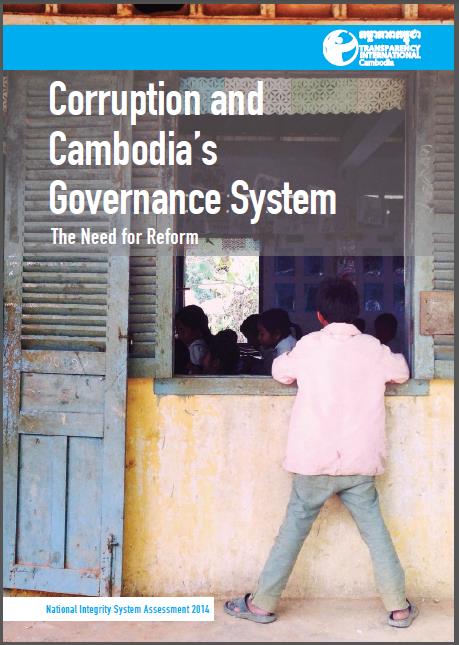
Corruption and Cambodia’s Governance System: The Need for Reform
Publication Year: 2014 / Sources: Transparency International CambodiaThe Cambodia National Integrity System Assessment provides an evaluation of the state of the country’s governance system. It assesses 13 institutions from the Judiciary to the Anti-Corruption Unit to civil society. A well-functioning National Integrity System safeguards against corruption and contributes to the larger struggle against abuse of power. Corruption undermines good governance, the rule of law, and fundamental human rights. It leads to misuse of resources, cheats citizens, harms the private sector, and distorts financial markets.Yet when governance institutions are characterised by appropriate regulations and accountable behaviour, corruption is less likely to thrive. Transparency International Cambodia has developed key policy recommendations based on the findings of this report. The recommendations, contained within, seek to engage government, donors and civil society to push forward crucial reforms to improve the integrity system. Strengthening the National Integrity System promotes better governance across all aspects of society, and, ultimately, contributes to a more just society overall.
Download: English | Khmer
Preah Reach Kram
Publication Year: 2009 / Sources: Royal Government of Cambodia (RGC)The purpose of this Law is to regulate the preparation, administration and the conduct of non-universal election to select Capital/Provincial, Municipality/ District/Khan Councils, further referred to in this Law as “Councils”.

Law on Election of Members of the National Assembly (LEMNA) and Amendments of Law on Election of Members of the National Assembly
Publication Year: 2013 / Sources: Royal Government of Cambodia (RGC)The purpose of this Law is to establish the electoral organs, procedures, and the conduct of the Election of Members of the National Assembly of the Kingdom of Cambodia.

Law on Senate Election
Publication Year: 2005 / Sources: Royal Government of Cambodia (RGC)This law is subject to determine the procedures and functions of the appointment and election of the Senators of the Kingdom of Cambodia as well as to determine electors, electoral colleges and constituencies.

Press Law
Publication Year: 1995 / Sources: Royal Government of Cambodia (RGC)This law determines the regime of the press and assures freedom of the press and freedom of publication in conformity with articles 31 and 41 of the Constitution of the Kingdom of Cambodia.

Draft Law on Anti-Corruption
Publication Year: 2010 / Sources: Royal Government of Cambodia (RGC)This law has a purpose to promote effectiveness of all forms of service and strengthen good governance and rule of law in leadership and state governance as well as to maintain integrity and justice which is fundamental for social development and poverty reduction.

Amended Law on Elections of Commune Councils
Publication Year: 2006 / Sources: Royal Government of Cambodia (RGC)The following is an unofficial translation of the Law on the Elections of the Commune Councils resulting from an amendment that came into force on 27 June 2006.
The version in Khmer of this law and its amendment should be referred to as the official text.

Fighting Corruption in Cambodia: The Demand for an International Standard Anti Corruption Law in Cambodia
Publication Year: 2005 / Sources: Pact Cambodia, PADCO, & CHRACThe RGC has made a commitment to “work rigorously with all stakeholders” on the draft law. As a citizen of Cambodia from government, private and civil society sectors you have the right to ensure that the government keeps its commitments to produce an international standard law on anti-corruption, and that the efforts to fight corruption are fully implemented and properly resourced.
